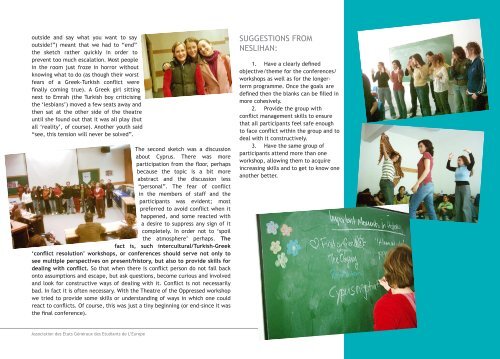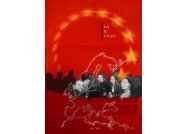turkish-greek civic dialogue - AEGEE Europe
turkish-greek civic dialogue - AEGEE Europe
turkish-greek civic dialogue - AEGEE Europe
You also want an ePaper? Increase the reach of your titles
YUMPU automatically turns print PDFs into web optimized ePapers that Google loves.
outside and say what you want to say<br />
outside!”) meant that we had to “end”<br />
the sketch rather quickly in order to<br />
prevent too much escalation. Most people<br />
in the room just froze in horror without<br />
knowing what to do (as though their worst<br />
fears of a Greek-Turkish conflict were<br />
finally coming true). A Greek girl sitting<br />
next to Emrah (the Turkish boy criticising<br />
the ‘lesbians’) moved a few seats away and<br />
then sat at the other side of the theatre<br />
until she found out that it was all play (but<br />
all ‘reality’, of course). Another youth said<br />
“see, this tension will never be solved”.<br />
The second sketch was a discussion<br />
about Cyprus. There was more<br />
participation from the floor, perhaps<br />
because the topic is a bit more<br />
abstract and the discussion less<br />
“personal”. The fear of conflict<br />
in the members of staff and the<br />
participants was evident; most<br />
preferred to avoid conflict when it<br />
happened, and some reacted with<br />
a desire to suppress any sign of it<br />
completely. In order not to ‘spoil<br />
the atmosphere’ perhaps. The<br />
fact is, such intercultural/Turkish-Greek<br />
‘conflict resolution’ workshops, or conferences should serve not only to<br />
see multiple perspectives on present/history, but also to provide skills for<br />
dealing with conflict. So that when there is conflict person do not fall back<br />
onto assumptions and escape, but ask questions, become curious and involved<br />
and look for constructive ways of dealing with it. Conflict is not necessarily<br />
bad. In fact it is often necessary. With the Theatre of the Oppressed workshop<br />
we tried to provide some skills or understanding of ways in which one could<br />
react to conflicts. Of course, this was just a tiny beginning (or end-since it was<br />
the final conference).<br />
Association des Etats Généraux des Etudiants de L’<strong>Europe</strong><br />
SUGGESTIONS FROM<br />
NESLIHAN:<br />
1. Have a clearly defined<br />
objective/theme for the conferences/<br />
workshops as well as for the longerterm<br />
programme. Once the goals are<br />
defined then the blanks can be filled in<br />
more cohesively.<br />
2. Provide the group with<br />
conflict management skills to ensure<br />
that all participants feel safe enough<br />
to face conflict within the group and to<br />
deal with it constructively.<br />
3. Have the same group of<br />
participants attend more than one<br />
workshop, allowing them to acquire<br />
increasing skills and to get to know one<br />
another better.<br />
Final Conference<br />
167







